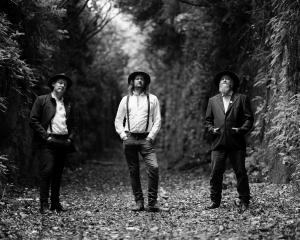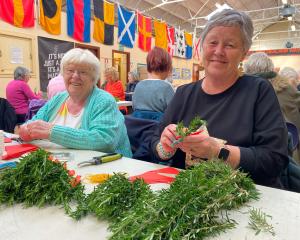
Blind runner Paul Barclay and guides Mark Boon and Rosie Hay will be easy to spot in their bright yellow running gear and will be negotiating the full marathon course in a tight group.
One of the guides will be tethered to Barclay at all times and the other will run in front or behind, pointing out hazards, changes in the running surface, and ensuring other runners do not get tangled with them.
It is a return to the Dunedin Marathon course for Boon, who ran the half marathon event last year with visually impaired runner Mike Asmussen.
All of these runners are members of the Christchurch chapter of Achilles International New Zealand running club, which supports disabled people to participate in local, national and international athletics events.
Barclay and Boon did their first full marathon together in June, and are looking forward to the challenge of tackling the Dunedin event.
Boon described the experience of running a full marathon as "exponentially harder" than a half marathon, requiring careful attention to hydration and energy levels.
"It’s also a mental game — you have to really work on keeping in the right head space."
Barclay (57) is no stranger to distance running, having run five full marathons and 14 half marathons, with the support of guides, since he joined the Archilles club in 2018. He is now on the club’s committee.
"Dunedin will be my sixth full marathon, and my aim is to run all of the road marathons in the South Island," he said.
Raised in South Otago, Barclay had a car accident that left him totally blind at the age of 22.
He had been a runner at high school, and went on to play blind cricket and goalball nationally and for New Zealand.
Barclay has lived in Christchurch for the past 30 years, worked with the (then) Blind Foundation and Arthritis New Zealand, and now runs his own business Vision Without Limits, providing disability employment support, accessibility advocacy, and career coaching.
Running with the Achilles club guides, who come from all backgrounds, is a joy for him.
"I am very grateful to Achilles for the support and opportunities to participate in these marathons and half marathons," he said.
Achilles club guides such as Boon and Hay were absolutely vital to his preparation, and to his success on race days.
"Quite simply, I couldn’t do it without them," he said.
Barclay has about six different guides he regularly trains and runs with, from within the Achilles club, all of whom are good friends and supporters.
"For me, it’s important to be able to get out on one of our weekly runs and train in the company of others — we have some great conversations while we are running," he said.
"Ever since I lost my sight, I have enjoyed challenging myself to do things — and I am very fortunate to have had the support to achieve running marathons."
Running as a blind athlete has its challenges, including the occasional trip and fall, although Barclay is very good at recovering his balance if he does trip.
"It’s something you get very practised at as a blind person — you learn not to put your hand down and instead to roll on your shoulder," he said.
The greatest trip hazards for blind runners like himself tended to be dogs off leashes and electronic scooters discarded on pavements.















